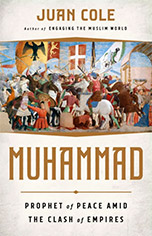The Algerian newspaper Echorouq [al-Shuruq] has published a positive review of the Arabic translation of my book,

Muhammad: Prophet of Peace amid the Clash of Empires
Available at Nicola’s Books in Ann Arbor
And Hachette
And Barnes and Noble
And Amazon
Juan says: In turbulent era, I am most gratified that Muslim readers on the whole have had a positive response to my book, and have remarked on its scholarly objectivity even while acknowledging its departure from traditional depictions. The author below points out that a lot of Western observers who see themselves as following Enlightenment ideals have not actually upheld the standards of reason and free inquiry when it came to writing about Islam. My suspicion, given that the author is Algerian, is that he is implicitly condemning Islamophobia among French advocates of laïcité or secularism. He sees my book as an exception, which actually does hew to Enlightenment values. That is high praise.
The reviewer writes:
In the midst of the conflicts in the world, and the wars and problems taking place among the global Powers, the book “Muhammad, Prophet of Peace,” was published, translated from the English of its author, Juan Cole. It appears from the Algerian publishing house of Ibn Nadim and from Dar al-Rawafed al-Thaqafiyyah in Beirut, to fill a void, in a Western language, on a topic concerning our Prophet and our beloved, Muhammad — may the blessings and peace of God be upon him, and what he presented to the world.
This book gives us an example of a scholarly view, to the achievement of which its author devoted his utmost efforts. He expresses it in a language that compels readers even if they might disagree with it, using a respectful style in his discussion.
It may be that Muslim readers do not need anyone to introduce them to the lord of men — may the blessings and peace of God be upon him. Still and all, none can claim that the door is at any time closed on probing the depths of the magnificent personality of the Prophet, the blessings and peace of God be upon him, or on researching more and more of its precious treasures.
However readers of Arabic may view the conclusions of this scholarly author, it is at the least a useful tour of the vast contrast between “the scholarly view” for which the West stands in theory, and the political circus in which it has too often engaged in practice and which it exports to us under the rubrics of freedom and democracy. We find exponents of the latter in the East, who raise these false slogans. They could not receive a higher practical response from the Western camp itself than the efforts of such an academic author, who gives a lesson to those who claim to stand for liberty by genuinely exemplifying the effort and responsibility that are appropriate to the free.
The author of the book attempted to answer several questions regarding whether the Prophet Muhammad, may God bless him and grant him peace, imposed the new religion with the edge of a sword.
It is pointed out in in the book’s introduction that non-Muslims who find time to read the Qur’an feel perplexed, because they will read a lot about the prophets Abraham, Joseph, Moses and Jesus, but they will not find much about the Prophet of Islam, Muhammad, may the peace and blessings of God be upon him. The Qur’an, although it addresses Muhammad, does not speak about him much.
Mustafa Akyol, a researcher at the Cato Institute in Washington, had written that the Islamic heritage produced much literature on the life and times of the Prophet, may the peace and blessings of God be upon him, which were called “prophetic biography.” He considered that this volume constitutes an addition to that corpus.
He said that the author of this book possesses an abundance of information and a breadth of knowledge, and that he deals with the subject through two unconventional arguments. The first links the dawn of Islam in the early seventh century AD in the Arabian Peninsula to the great geopolitical conflict at the time between the Christian Byzantine Empire in Constantinople and the Sassanid Zoroastrian Empire in what is known today as Iran.
He cited for this point of view the beginning of Surah Al-Rum [chapter of Rome, 30:1-6] in the Holy Qur’an, where God Almighty says: “Rome lies vanquished in the nearest province. But in the wake of their defeat, they will triumph after a few years. Before and after, it is God who is in command. On that day, the believers will rejoice in the victory of God; he causes to triumph whomever he will, and he is the Mighty, the Merciful.”
In Cole’s view, this verse all along pointed to the extent of the early Muslims’ sympathy for the monotheistic Christians in their conflict with their pagan enemies.
As for the second premise from which he begins, it goes against the grain of the prevailing views and images of the Prophet Muhammad (peace be upon him) in the West, inasmuch as the researcher describes the Messenger of Islam as a man of peace who sought to spread his monotheistic belief and tried to establish a harmonious multicultural environment.
The author based that hypothesis on the early years of the Prophet’s message and on the persecution that the Messenger of God faced in Mecca, and said that the wars the Prophet (may the peace and blessings of God be upon him) fought in the later stages of his ministry were defensive in nature and fall into the category of the “just war.”
A. A.
Trans. J. Cole



 © 2025 All Rights Reserved
© 2025 All Rights Reserved